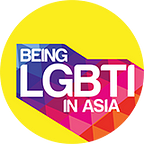Media as a tool for change: Advancing LGBT rights in China
17 January 2016
On 17 January, the United Nations Development Programme (UNDP) China co-sponsored the 5th China Rainbow Media Awards Ceremony in Beijing to recognise and honour media reports, organisations and individuals for their objective and fair treatment of sexual minority topics.
The China Rainbow Media Awards, organised by the Beijing Gender Health Education Institute, are the first Chinese media awards initiated by and focused on sexual minority communities (Lesbian, Gay, Bisexual, Transgender, Intersex and others). The China Rainbow Media Awards encourage Chinese media to engage in fair and thorough reporting on sexual minority topics, and to contribute to the promotion of a diverse and tolerant society.
Patrick Haverman, Deputy Country Director for UNDP China, in his opening remarks commended the events awardees, stating “tonight we are here to honour those in the media who have had the curiosity, the courage or simply the humanity to pay attention to these issues and educate the public to respect diversity.”
Lesbian, Gay, Bisexual, Transgender and Intersex (LGBTI) identities are still vastly underrepresented in news media and when represented are often represented inaccurately, stereotypically, harmfully or without a clear understanding of Sexual Orientation, Gender Identity and Gender Expression (SOGIE). How issues are portrayed in the media and dominant social rhetoric are closely interconnected and negative media representations of LGBTI people and SOGIE issues currently play a role in the perpetuation and legitimization of widespread stigma and discrimination against LGBTI people.
In 2015 UNDP launched a second phase to the ‘Being LGBT in Asia’ initiative, seeking to strengthen LGBTI community networks and empower LGBTI people in Asia, including China. One of the key objectives of the programme is the reduction of stigma, discrimination and harmful practices against LGBTI, including activities to address media coverage of LGBTI identities and issues as well as to strengthen the capacity of media actors to engage and advocate on SOGIE issues.
To complement the awards, UNDP China organised a 1-day Media and SOGIE training workshop, inviting 20 participants from various areas of media. The workshop focused on developing effective, sensitive and inclusive communications strategies for journalists and media professionals dealing with SOGIE issues and the use of media as a tool for change in the advancement of LGBTI rights and anti-discrimination in China.
Originally published at www.cn.undp.org on January 17, 2016.
